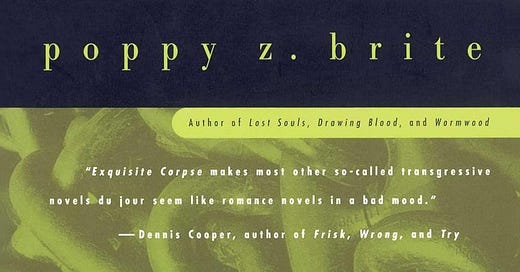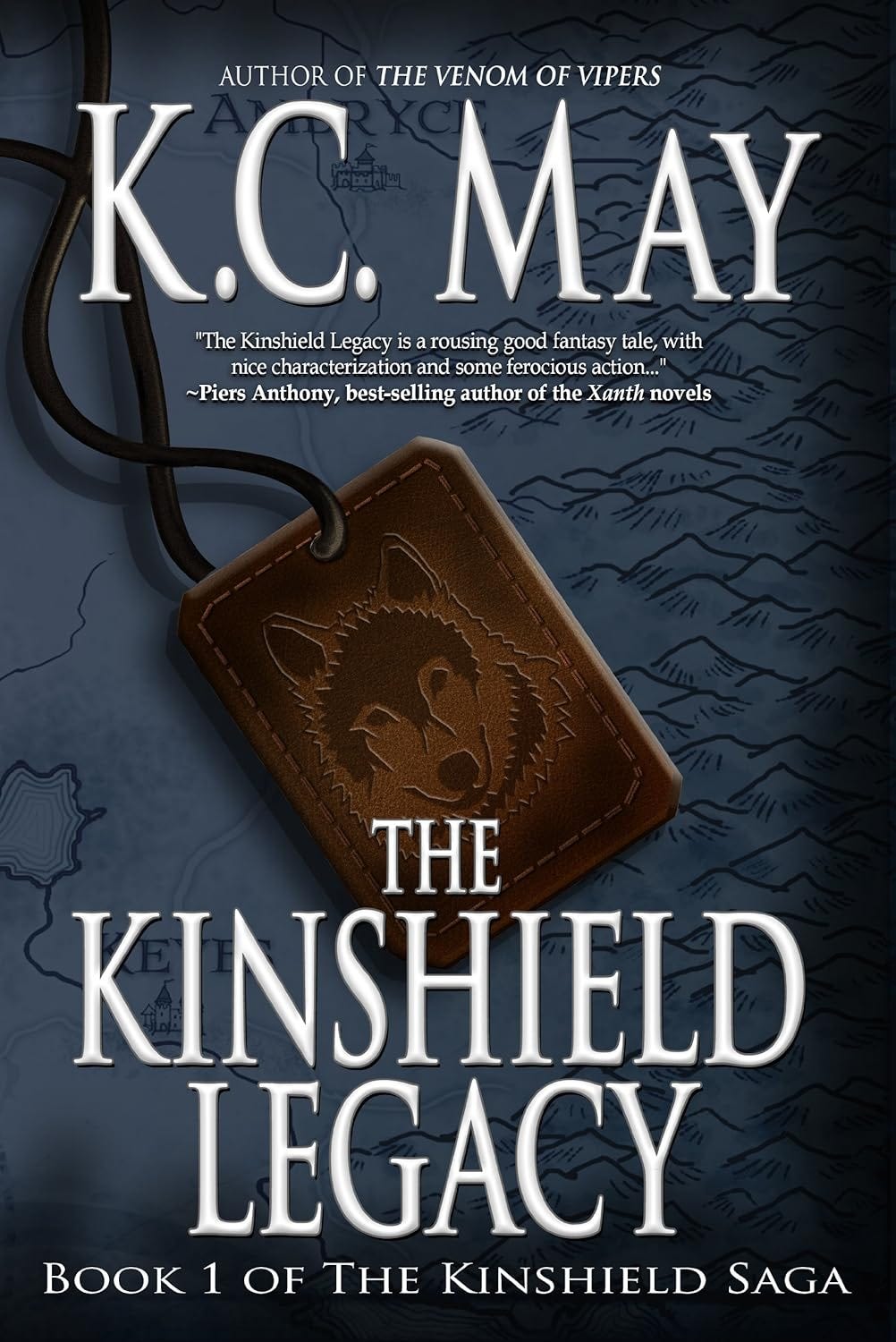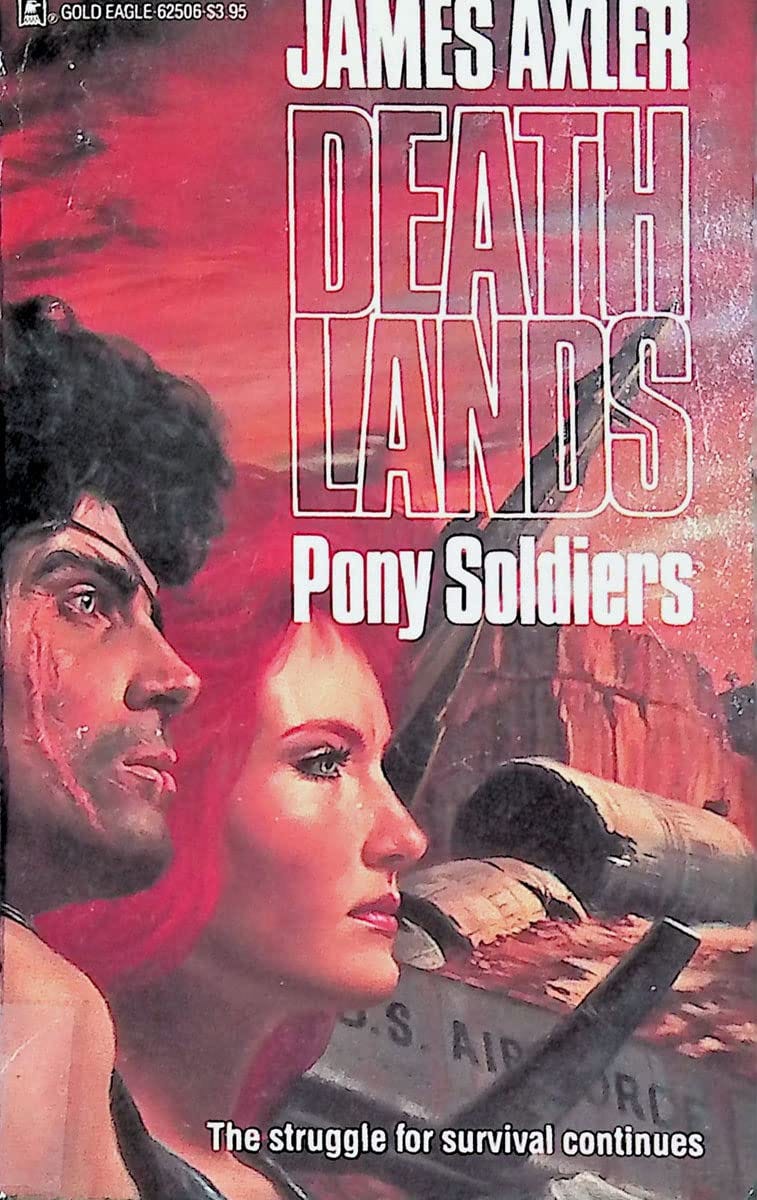“hitler was actually a transwoman of color and misgendering her will NOT be fucking tolerated” -Fyodor Dostoevsky
Poppy Z. Brite - Exquisite Corpse (1996)
Every few years it becomes necessary for a new generation of alternative youngsters to imagine they invented being gay. Poppy Z. Brite’s contribution to this noble cycle comes with Exquisite Corpse, a novel which passes the reins of homosexuality into the eager hands of obese Wiccan fujoshis long before Tumblr or Ao3 would become their ultimate redoubt. For its theoretical ideal reader, existing somewhere at the intersection between chubby Columbine fangirl and Rocky Horror-obsessed theater dork, this is undoubtedly a life-changing work; for everyone else, it’s an exercise in self-indulgence as obvious as every “STUCK ON AN ISLAND WITH ONE DIRECTION” piece on Wattpad and only marginally better written. We’re sad, we’re gay, we’re sad about being gay, and perhaps we’re gay because we’re sad, but beyond this reflexive mathematical arrangement, Brite comes up woefully short of any meaningful commentary on serial murder OR sodomy despite writing a novel composed almost exclusively of both.
It really blows my mind that the pull quote on the cover of the edition I read comes from Dennis Cooper- he’s perhaps too forgiving in general of anyone in the “transgressive” space, but in this case he’s also allowing himself to be stylistically cuckolded in a way that seems a bit shameful. Exquisite Corpse trods Cooper’s home turf almost exclusively, but without any of that author’s genuine bite or wild-eyed intensity. Cooper, on some level, really wants to butcher pretty twinks; Brite only writes about it out of a desire to leverage the violence for pathos, a shortcut that allows her to skip the inconvenient parts of storytelling like characterization or narrative coherence. The entire book functions in this manner, really- Brite has never encountered a plot point too ridiculous or structurally unsound to wring for whatever drops of effete tragedy might drip out, which is why Exquisite Corpse largely proceeds as a collection of finger-wagging socially conscious vignettes. Be it the AIDS crisis, Vietnamese diaspora, abusive relationships, poverty, heroin addiction, or any number of Tough Transgressive Topics, they all have their moment in the sun but zero impact on the plot. They exist not to flesh out a story, but to present Brite as someone who really knows the dark, seedy underbelly of modern America, despite clearly not knowing a fucking thing about anything.
Brite confuses misery with authenticity, and as such feels that creating suitably miserable characters means they are suitably authentic in turn- this would be incorrect. With four(!) main characters and a certain quota of bloodshed and assfucking to hit alongside soulful sociopolitical statements, there’s not much room for each to get fleshed out, so they are instead reduced to one or two crucial dissatisfactions: Andrew’s imprisonment and murderous cravings, Jay’s loneliness and… murderous cravings, Lucas’ full-blown AIDS, and Tran’s estrangement from his family and abusive relationship with Lucas. It would take 500 pages for this novel to actually accomplish what it gestures toward, but Brite has 250 to work with, and in the battle of page space between functional characterization and yet another fucking description of a New Orleans bar interior, the latter wins out handily. The result is supremely herky-jerky pacing, where labored, wheezing descriptions of New Orleans nightlife or endless ruminations on how hard it is to be hot and gay and sad suddenly slam headlong into yet another sex or murder scene with all the elegance of a misfiring Camaro. And those scenes themselves don’t fair much better- provocative to the unseasoned, sure, but neither vulgar nor creative enough to turn any heads that have read, well, Dennis Cooper before.
I borrowed this from my girlfriend to read and review and the bookmark inside was a ticket stub from an old Stabbing Westward show. I can’t imagine a better one-line review than that.
K.C. May - The Kinshield Legacy (The Kinshield Saga #1) (2005)
I’M AT THE BLACKMITH’S SHOP. I’M AT THE OLD TAVERN. I’M AT THE COMBINATION BLACKSMITH’S SHOP AND OLD TAVERN.
This is cute. Some other reviewers have referred to The Kinshield Legacy as “light epic fantasy,” which sounds like an oxymoron but is a remarkably fair description of the book. It’s got a folksy kind of charm to it: self-published, admirably straightforward (especially now, in a landscape where fantasy is still largely stumbling all over itself to claim Martin’s seemingly abdicated throne,) and plainly in love with its own tropes in a way that refutes irony or self-consciousness outright. It is a labor of love that is patently unsophisticated in a manner that actually makes me enjoy it more. GAVIN KINSHIELD is a RELUCTANT HERO who must band together with an UNLIKELY AND RAGTAG GROUP OF ADVENTURERS to stop the EVIL SORCERER and GET HIS NUT WITH THE HOT SWORD LADY. Fuck it, I’m in. The individual plot beats don’t really matter- you know how all of this is gonna go down, at least in the broad strokes. The process is well established and the plot is just slightly unnecessarily convoluted enough to set up and knock down minor cliffhangers from (very short) chapter to (very short) chapter- I got through 300 or so pages in just a few nights.
Is it well written? Eh, we’ll call it workmanlike. The Kinshield Legacy’s greatest strength is in its guilelessness and simple likeability. This is a sort of traditional fantasy novel which, in 2005, was rapidly falling out of fashion but finds itself in much better company 20 years later. The heroes are unequivocal heroes (if, perhaps, rough around the edges)- the villains unequivocal villains. In fact, I’d argue that within its deliberate simplicity is actually a somewhat striking, archetypal work- the lack of ambiguity or political nuance allows these simple, patterned characters a kind of primary color contrast that I find refreshing. Gavin Kinshield’s deep reticence toward claiming the throne informed by his personal failures as a family man, Daia Saberheart’s rejection of both her hereditary and chosen paths in life in order to follow the new king- these are not complex characters, but they are solid and elemental in a way that reminds one of the natural power of simple fantasy stories. Combined with worldbuilding that’s just distinct enough from the usual elf’n’orc riffraff and I feel comfortable recommending it. It’s not without faults- there’s probably an unnecessary excess of characters, there’s some very forced interconnectivity between the story threads, and I’m not sure that its simplicity will carry it through a four-book series- but I enjoyed this enough that I’ll give the second entry a try sometime soon.
James Axler (Laurence James) - Pony Soldiers (Deathlands #6) (1988)
I first encountered the Deathlands series maybe 6 months ago at a local thrift store where something like a dozen of these things were on sale at a dollar a piece. One look at the cover art and the absolutely gorked descriptions on the back had me sold on the spot. And, of course, they were in the ideal condition for this sort of thing: beat to shit, spines cracked into near unreadability, cheap binding coming unglued, you know the deal. I purchased them all and have since found more at other used book stores. I have decided I want to obtain the entire series (of which there are over a hundred) with one crucial restriction: I will not acquire any of these through online sellers. I will buy them only from secondhand stores, preferably in barely adequate physical condition. It just feels correct.
Pony Soldiers is the first I’ve read in the series, the sixth entry: in true pulp tradition, reading these in order might add to the experience but is ultimately unnecessary. What are you in for? EXACTLY what you imagine. Ryan Cawdor and his ragtag team of wasteland survivors scratch out a living adventuring across post-nuclear holocaust America trying to find a better life while dispatching mutants and men by the dozen via blade, bullet, or bludgeon. There’s lots of GUNS and all the women are fucking HOT and the men are fucking GRUFF and the mutants are fucking DEADLY and the characters they encounter have MYSTERIOUS SECRETS which could make them allies or enemies depending on ever-changing circumstances. In short, it RULES. What appears to be the primary structural gimmick of the series- a collection of pre-war fallout shelters with connecting teleportation systems that the team can enter but not necessarily control the destination of- is an outstanding device to create limitless monster-of-the-week potential which allows the lack of meaningful continuity to be easily handwaved. Rarely does a series like this provide such an elegant excuse, and I’m eager to get further in to see what sort of wild bullshit they cook up.
In this case: we’re in the American southwest, where Cawdor’s team encounters a local tribe of American Indians who are in a long-running low-intensity conflict with a group of raiders who have modeled themselves after General George Custer’s army. What follows is what I imagine the entire series is composed of: a tense alliance of convenience, ragged firefights, daring rescues and escapes, and broad yet punchy character moments that merely reiterate what you already know: that the whole team are rough and ready marauders who will do whatever it takes to survive in post-nuclear America and also that the girls in the group have FAT TITS. It goes without saying that this is all excellent. What makes it distinct? Two things, to my mind. First, a broad range of influences reconfigured into the fantasy, from old Westerns to early Cold War spy films to more hardbitten and contemporary (for their time) post-apocalyptic works like Escape From New York or Wasteland, providing a rhythm and atmosphere a bit richer than expected. Second: a lean and rangy sadistic streak that provides the harder edge that you might want from this sort of setting but rarely find. The torture scene toward the end is legitimately nauseating and the absolute willingness to threaten the one adolescent male character with violent gang rape does a lot to set this apart from the pack.
In short, highly recommended for those among us with death metal album art tattoos and/or who believe that only the first two Fallout games are real.






